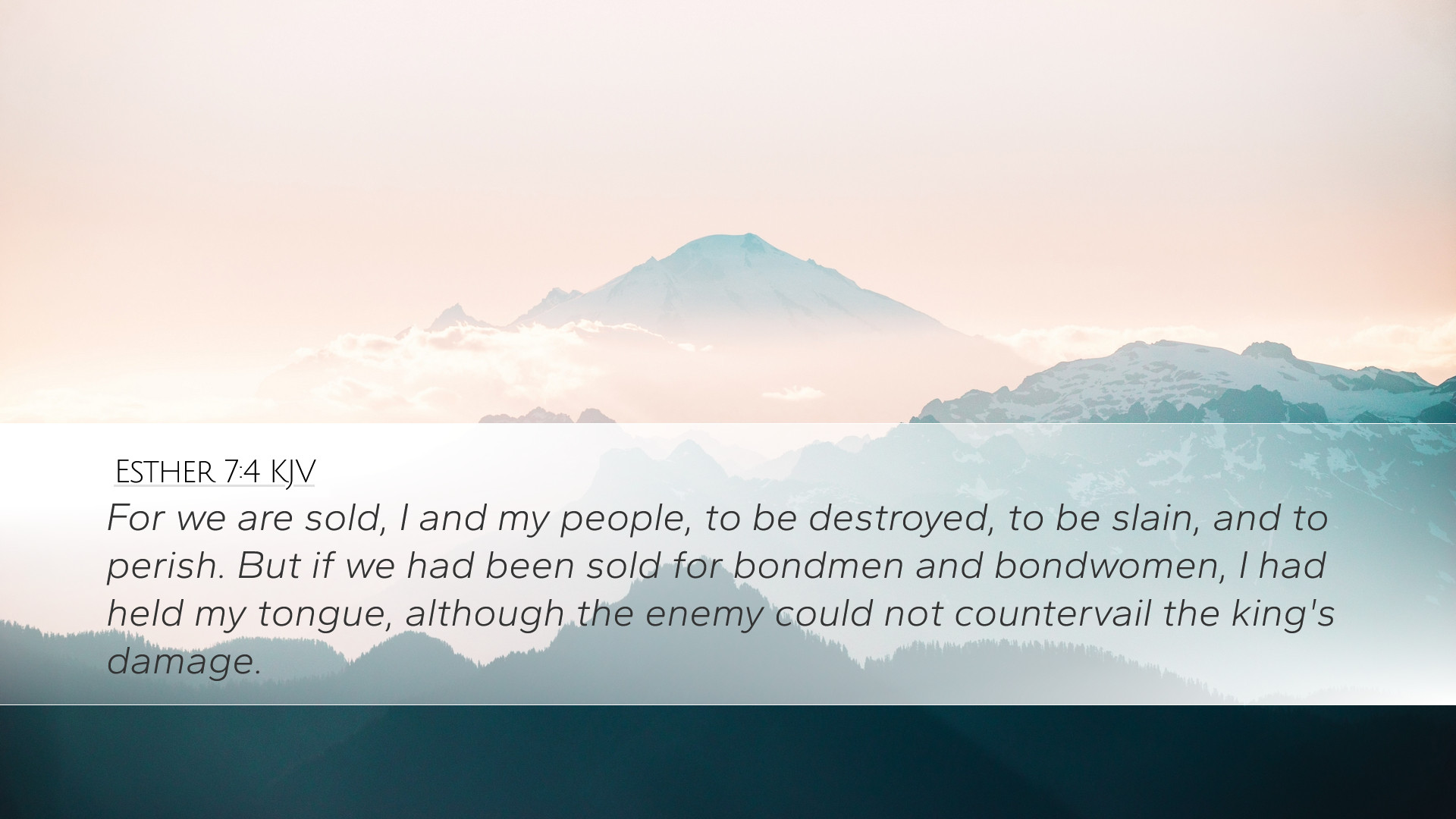Old Testament
Genesis Exodus Leviticus Numbers Deuteronomy Joshua Judges Ruth 1 Samuel 2 Samuel 1 Kings 2 Kings 1 Chronicles 2 Chronicles Ezra Nehemiah Esther Job Psalms Proverbs Ecclesiastes Song of Solomon Isaiah Jeremiah Lamentations Ezekiel Daniel Hosea Joel Amos Obadiah Jonah Micah Nahum Habakkuk Zephaniah Haggai Zechariah MalachiEsther 7:4
Esther 7:4 KJV
For we are sold, I and my people, to be destroyed, to be slain, and to perish. But if we had been sold for bondmen and bondwomen, I had held my tongue, although the enemy could not countervail the king's damage.
Esther 7:4 Bible Commentary
Commentary on Esther 7:4
Esther 7:4 (KJV): "For we are sold, I and my people, to be destroyed, to be slain, and to perish. But if we had been sold for bondmen and bondwomen, I had held my tongue; although the enemy could not countervail the king's damage."
Introduction
The verse in question is a pivotal moment in the Book of Esther, encapsulating the tension and peril faced by the Jewish people during the Persian period. Esther, who has risen to the position of queen, reveals her Jewish identity and the plot against her people orchestrated by Haman. This commentary synthesizes insights from Matthew Henry, Albert Barnes, and Adam Clarke, illuminating the text's theological, historical, and ethical dimensions.
Contextual Overview
Historical Background: The Book of Esther is set during the reign of King Xerxes I of Persia, around the 5th century B.C. The narrative unfolds against a backdrop of significant Jewish diaspora life, where the Jewish people faced occasional hostility and persecution.
Literary Context: The verse comes at a crucial juncture in the story where Esther, having prepared to reveal Haman’s plot, speaks directly to the king. This builds the plot tension and sets the stage for her deliverance of the Jewish people.
Notable Themes and Theological Insights
- The Plight of the Jewish People: The phrase "For we are sold..." conveys a distressing sense of doom and urgency. Matthew Henry describes this as an expression of catastrophic fate, highlighting the existential threat Jews faced under Haman's edict. Their impending destruction underscores a significant theme of survival among minority groups in a hostile environment.
- The Role of Divine Providence: While the name of God is notably absent in the Book of Esther, Clarke notes the underlying theme of divine providence, which suggests that the sequence of events—including Esther’s rise to power—is orchestrated by God to safeguard His people. Esther's appeal to the king indicates a belief in a higher moral authority.
- The Cost of Inaction: Esther's statement, "But if we had been sold for bondmen and bondwomen, I had held my tongue," articulates a significant ethical dilemma. Barnes emphasizes that Esther recognizes the gravity of her position; the plight of her people is not merely a political issue but a matter of justice. It suggests that silence in the face of moral wrong is itself a sin of omission.
- The Complexity of Identity: Esther’s act of revealing her identity is profound. It signifies the importance of authenticity and the courage required to stand for one's people. This act invites theological reflection on the nature of identity within the Christian context, urging believers to embrace their faith openly, even amid societal pressures.
Commentary Insights
Matthew Henry: Henry describes Esther's articulate plea highlighting the gravity of the situation, asserting that her role is critical in determining her people's fate. He emphasizes the importance of courageous leadership and the need for those in positions of influence to confront injustices directly.
Albert Barnes: Barnes points out the rhetorical strength of Esther’s appeal. By framing the issue as one of bondage rather than mere loss of life, she emphasizes the severity of the threat. This framing can be understood as a commentary on the nature of oppression, where loss of freedom is depicted as worse than death itself.
Adam Clarke: Clarke delves into the emotional burden Esther bears while articulating her plea. He notes that her address to the king not only reveals her vulnerability but also her strategic foresight. The juxtaposition between her personal stakes and the collective suffering of her people captures a crucial aspect of leadership.
Practical Application
Esther 7:4 serves as a relevant text for contemporary issues of justice, identity, and courage. Here are several applications for pastors, students, and theologians:
- The Call to Advocacy: Emphasizing the importance of speaking out against injustice mirrors Esther's own activism. Congregations can be encouraged to recognize social injustices in their contexts and respond with action.
- The Complexity of Ethical Choices: Esther’s situation illustrates the challenges of moral decision-making. This serves as a poignant reminder of the need for spiritual wisdom when confronting difficult circumstances.
- Empowerment in Vulnerability: Esther’s vulnerability becomes her strength. This teaches that embracing one’s identity and circumstances can lead to profound community transformation.
- Divine Providence in Human Affairs: The absence of an explicit mention of God in Esther challenges individuals to perceive divine involvement in their lives, calling them to trust in God's control amidst chaos.
Conclusion
Esther 7:4 encapsulates a rich tapestry of themes concerning justice, identity, and divine providence. It serves as a reminder of the essential nature of courageous leadership in the face of existential threats. The insights drawn from Henry, Barnes, and Clarke provide a multi-faceted understanding of this significant text, equipping leaders and scholars alike to discern God’s hand in their narratives and act with conviction for justice.


